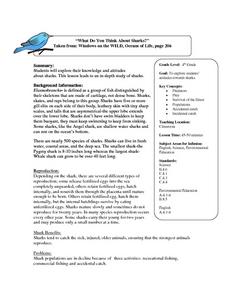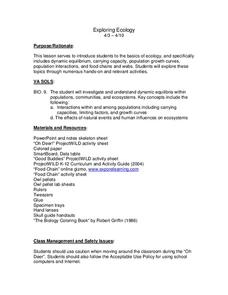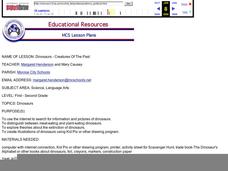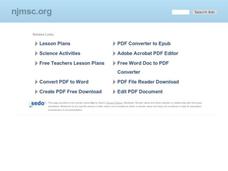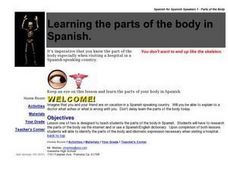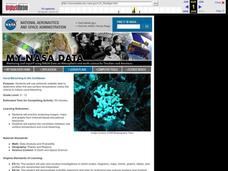Curated OER
Dino Fossils
Primary paleontologists discover the information they can gather from examining fossils. They place pictures in the correct sequence showing how an animal becomes a fossil. They discuss which sediments would preserve fossils better as well.
Curated OER
What Do You Think About Sharks?
Fourth graders explore sharks. They read a story about sharks and act out using Reader's Theater. They discuss fact and attitude statements about sharks and complete a Shark Survey. They create a shark promotion brochure informing...
Curated OER
Exploring Ecology
Students explore the basics of ecology through numerous hands-on and relevant activities. They participate in an online food chain demonstration, which explores food web dynamics. They dissect owl pellets, examine the prey's bones, and...
Curated OER
Gamelan Music-- Bela Bartok
In this music worksheet, students investigate gamelan music of Bali and in particular a piece by Bela Bartok. Students read about the history and unique instrumentation and answer 8 questions. Note: It appears that students need access...
Curated OER
Marine Animal Life Cycles
Fourth graders identify the life cycle of a crab and other marine animals. In this marine life lesson, 4th graders complete a crab puppet activity, explore crab moulting, research the life cycle stages of a crab, and identify crab...
Curated OER
Test Your Spelling Skills
In this spelling skills worksheet, students find the small words inside the bigger words by analyzing the words below. Students underline the smaller word to complete the 20 examples.
Curated OER
Dig Magazine Archeology Quiz #106
In this Dig Magazine archeology quiz, students answer 12 multiple choice questions complementing the October 2009 issue. Page contains answer and additional resources link.
Curated OER
Breaking News English: Jogging Barefoot Healthier Than In Shoes
For this English worksheet, students read "Jogging Barefoot Healthier Than In Shoes," and then respond to 1 essay, 47 fill in the blank, 7 short answer, 20 matching, and 10 true or false questions about the selection.
Curated OER
ESL: Journalism Article Comprehension
In this ESL comprehension worksheet, students read a passage, then complete a variety of warm-up and pre/post reading activities. Homework suggestions are included.
Curated OER
Swim Like a Whale or Fish?
Students recognize the difference between whales and fish by categorizing them according to their method of swimming. They synthesize this information by simulating the swimming patterns of whales and fish and comparing it to their own.
Curated OER
Fun Bones
Students learn different bones of the body while using various body awareness concepts.
Curated OER
Strong Fingers
Students discover strength resistance of arms in different positions by practicing personal defense positions.
Curated OER
Creating a National Park
Learners explore how national parks are created, operate and benefit society by creating a new national park for their state.
Curated OER
Dinosaurs - Creatures Of The Past
Students use the Internet to search for dinosaurs, then distinguish between meat-eating and plant-eating dinosaurs. They explore theories about the extinction of dinosaurs and create illustrations of dinosaurs using Kid Pix or other...
Curated OER
Dinosaurs: Creatures of the Past
Students search for information and pictures of dinosaurs to distinguish between meat-eating and plant-eating dinosaurs. They explore theories about their extinction, and create illustrations of dinosaurs using Kid Pix or other drawing...
Curated OER
The Dinosaur Body
Young scholars investigate how body design affects balance. They make simple models of dinosaur bodies using straws and marshmallows. Before making their models, they discuss the effects of gravity and the importance of balance in body...
Curated OER
Learning the Parts of the Body in Spanish
Young scholars use the Internet or Spanish dictionary to find the Spanish words for the names of the parts of the body. They examine expressions needed in case they would get hurt and needed to go to the hospital.
Curated OER
It's All About Me!
Students study the five major body system in this unit. They examine how to keep themselves healthy.
Curated OER
Site Robbers
Fourth graders interview a Native American and write a newspaper article or letter that expresses concern about robbing archaeological sites.
Curated OER
House Builders
Students name the workers involved in building a house. They label tools used by different workers and the parts of the house that the workers are responsible for.
Curated OER
Coral Bleaching in the Caribbean
Students use authentic satellite data on the NASA website to determine when the sea surface temperature meets the criteria to induce coral bleaching.
Curated OER
The effects of microgravity
Fourth graders are given a scenario in the lesson that presents a problem that needs to be solved. They conduct research from multiple sources in order to gather information. This is used to contribute to possible solutions proposed by...
Curated OER
From Lake to Lake
Fourth graders investigate the formation of the Great Salt Lake. They conduct research using a variety of resources. The information is used to construct a timeline of the history. Each phase of history should include facts and...



